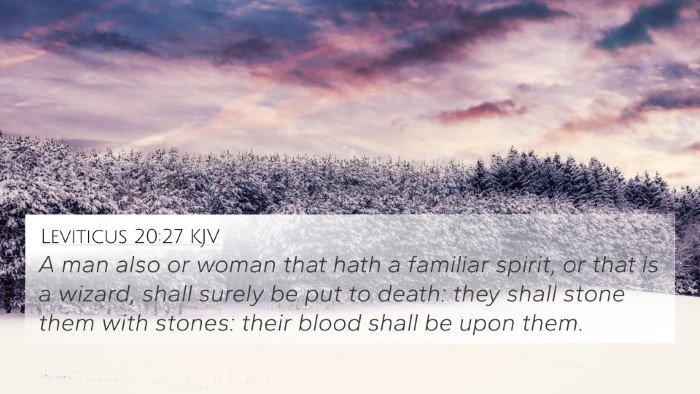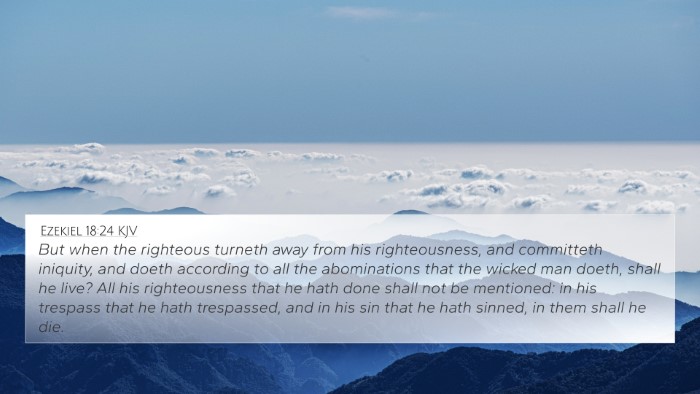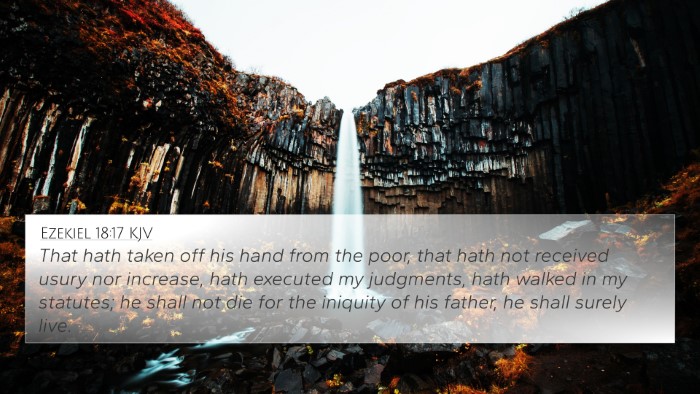Ezekiel 18:13 - Verse Meaning and Interpretation
Ezekiel 18:13 states: "Hath given forth upon usury, and hath taken increase: shall he then live? he shall not live: he hath done all these abominations; he shall surely die; his blood shall be upon him." This verse addresses themes of personal responsibility and the consequences of sin.
Understanding the Verse
This verse is a part of a larger discourse in the book of Ezekiel, emphasizing the importance of individual morality and accountability. Ezekiel uses the imagery of usury and increase to illustrate the sinful nature of exploitation and greed.
Insights from Public Domain Commentaries
-
Matthew Henry:
Henry notes that this verse demonstrates God’s justice, emphasizing the principle that individuals are responsible for their own actions. The act of lending with usury represents a serious moral failing in the eyes of God.
-
Albert Barnes:
Barnes discusses the implications of usury in ancient Israel, labeling it as a form of unjust enrichment. He highlights that one who takes advantage of others for personal gain is headed for destruction, affirming that God's judgement is inevitable for such conduct.
-
Adam Clarke:
Clarke elaborates on the spiritual and physical ramifications of these actions, stressing that those who engage in such practices have separated themselves from God’s covenant, resulting in dire consequences ultimately leading to spiritual death.
Key Themes and Concepts
The central themes in Ezekiel 18:13 include:
- Personal Accountability: Each individual is accountable for their own sins and decisions.
- The Nature of Sin: Exploitative practices such as usury are condemned.
- Divine Judgement: God’s judgement is pronounced on those who continue in wickedness.
- Consequences of Actions: Choices have ramifications not only in earthly terms but also in a spiritual context.
Bible Cross-References
To deepen understanding, the following Bible verses can be referenced in connection with Ezekiel 18:13:
- Leviticus 25:36-37: Discusses the prohibition of usury among God’s people.
- Psalm 15:5: Reflects on the righteous man who does not take bribes or usury.
- Proverbs 28:8: Describes the consequences of gaining wealth unjustly.
- Isaiah 33:15: Speaks of the character of those who are upright and the rewards they receive.
- Jeremiah 22:13: Condemns those who build their house unjustly, relating to oppressive gain.
- Ezekiel 22:12: Highlights corruption and deceit prevalent among God’s people.
- Matthew 23:25-26: Jesus warns against hypocrisy and focuses on cleansing the inside rather than mere outward actions.
Connections Between Bible Verses
Understanding Ezekiel 18:13 can be enriched through cross-referencing and thematic connections to other scripture passages. The concept of personal responsibility echoes throughout the Old and New Testaments both directly and through parabolic teachings.
Linking Bible Scriptures
As one explores the theme of justice, the narrative of the unjust steward in Luke 16:1-13 presents a parallel where the character's exploitation leads to dire consequences, indicating that one's misdeeds inevitably find them out.
Cross-Referenced Themes in the Bible
Exploitative practices are consistently condemned throughout scripture. Acts 17:30 reflects how God has overlooked former ignorance but now calls all to repentance, reinforcing the need for personal accountability in light of knowledge.
Conclusion
Ezekiel 18:13 serves as a powerful reminder of the profound implications of personal choices and moral integrity. By understanding and applying this scripture alongside other biblical texts, believers are encouraged to pursue righteousness and avoid practices that exploit or harm others.
Further Bible Study Tools
For deeper study on cross-referencing Biblical texts, various tools for Bible cross-referencing such as software or guides can be invaluable:
- Utilizing a bible concordance to find thematic connections.
- Referencing a bible cross-reference guide for more scripture links.
- Engaging in bible cross-reference study methods to enhance comprehension.
- Following a bible chain reference pattern for thematic studies.














